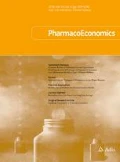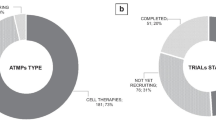Abstract
Background
In Ireland, all new drugs are considered for a formal pharmacoeconomic evaluation (PE) prior to a reimbursement decision. All evaluations are conducted by the National Centre for Pharmacoeconomics (NCPE). The objectives of this study were to describe the evaluation process and to examine the movement of drugs through the process.
Methods
The movement of all drugs submitted to the NCPE (from January 2010 to December 2015 inclusive) was investigated.
Results
A total of 230 Rapid Review submissions (each pertaining to one drug for one indication) were made. The Rapid Review process determines the requirement for a full PE. A full PE was deemed unnecessary in 108 cases (47 %). A positive reimbursement recommendation was made in 100 of these (a price reductions was advised in 25 cases and a recommendation to restrict/monitor usage was made in 35). The requirement for a full PE was recognised in 122 cases (53 %). In 12, subsequent payer-led price negotiations negated the requirement for a full PE, and reimbursement was recommended. In 24 cases, a timely full submission was not made; cost effectiveness could not be established. Fifteen interventions are currently going through the submission process. To date, 71 full PEs have been completed by the NCPE. Reimbursement was recommended in 19 and was not recommended in eight. Reimbursement was not recommended ‘at the submitted price’ in 44. Of these, reimbursement was subsequently approved in 34 (77 %) following price negotiations. To date, negotiations are on-going in a further six cases. In all, negotiations have been informed by the NCPE. A negative recommendation was reached in the remaining four.
Conclusions
Over the study period, the NCPE evaluated 230 drugs for which reimbursement was sought. In total, a positive reimbursement recommendation has been made in 165 cases (72 % of all drugs submitted, or 79 % when drugs currently undergoing the process are excluded). A price reduction was deemed necessary in 71 (43 %) of the 165 cases, and a recommendation to restrict/monitor usage was made in 35 cases (21 %).



Similar content being viewed by others
References
Nolan A, Barry S, Burke S, Thomas S. The impact of the financial crisis on the health system and health in Ireland. Copenhagen: World Health Organization Regional Office for Europe; 2014. http://www.euro.who.int/__data/assets/pdf_file/0011/266384/The-impact-of-the-financial-crisis-on-the-health-system-and-health-in-Ireland.pdf?ua=1. Accessed 10 June 2016.
Organisation for Economic Co-operation and Development [OECD]. Health at a glance 2015: OECD indicators. Paris: OECD Publishing; 2015. doi:10.1787/health_glance-2015-en. Accessed 10 June 2016.
Irish Pharmaceutical Healthcare Association Ltd [IPHA]. Framework agreement between the Irish Pharmaceutical Healthcare Association Ltd and the Department of Health and the Health Service Executive on the supply terms, conditions and prices of medicines. Dublin: IPHA; 2012. http://www.ipha.ie/alist/ipha-hse-agreement.aspx. Accessed 21 Jan 2016.
Health Services Executive and Irish Pharmaceutical Healthcare Association Ltd; Department of Health and Children. Agreement between the Irish Pharmaceutical Healthcare Association Ltd and the Health Services Executive on the supply terms, conditions and prices of medicines supplied to the health services. Dublin: Irish College of General Practitioners; 2006. http://www.icgp.ie/go/library/catalogue/item/D11E0314-FDBD-4207-AAF0DBED49C40E7B/?print. Accessed 21 Jan 2016.
Barry M, Usher C, Tilson L. Public drug expenditure in the Republic of Ireland. Expert Rev Pharmacoecon Outcomes Res. 2010;10(3):239–45.
Health Services Executive and Irish Pharmaceutical Healthcare Association Ltd [IPHA]; Department of Health and Children. Agreement between the Irish Pharmaceutical Healthcare Association Ltd and the Health Services Executive on the supply terms, conditions and prices of medicines supplied to the health services. Dublin: IPHA; 2009. http://www.ipha.ie/alist/ipha-hse-agreement.aspx. Accessed 21 Jan 2016.
Government of Ireland (Oireachtas). Health (Pricing and Supply of Medical Goods) Act 2013, Number 14. Irish Statue Book. Dublin: Office of the Attorney General; 2013. http://www.irishstatutebook.ie/eli/2013/act/14/enacted/en/html. Accessed 21 Jan 2016.
National Centre for Pharmacoeconomics [NCPE]. Dublin: NCPE; 2016. http://www.ncpe.ie. Accessed 21 Jan 2016.
Health Information and Quality Authority [HIQA]. Guidelines for evaluating the clinical effectiveness of health technologies in Ireland. Dublin: HIQA; 2011. https://www.hiqa.ie/publications/guidelines-evaluating-clinical-effectiveness-health-technologies-ireland. Accessed 22 Feb 2015.
Health Information and Quality Authority [HIQA]. Guidelines for the economic evaluation of health technologies in Ireland. Dublin: HIQA; 2014. http://www.hiqa.ie/publications/guidelines-economic-evaluation-healthtechnologies-ireland. Accessed 22 Jan 2016.
Health Information and Quality Authority [HIQA]. Guidelines for the budget impact analysis of health technologies in Ireland. Dublin: HIQA; 2014. https://www.hiqa.ie/publications/guidelines-budget-impact-analysis-health-technologies-ireland-0. Accessed 29 Feb 2016.
Tilson L, O’Leary A, Usher C, Barry M. Pharmacoeconomic evaluation in Ireland: a review of the process. Pharmacoeconomics. 2010;28(4):307–22.
European Medicines Agency [EMA]. Human medicines: regulatory information. London: EMA; 2016. http://www.ema.europa.eu/ema/index.jsp?curl=pages/regulation/landing/human_medicines_regulatory.jsp&mid=. Accessed 29 Jan 2016.
National Centre for Pharmacoeconomics [NCPE]. Template for rapid review assessment submissions from manufacturers. Version 1.4. Dublin: NCPE; 2012. http://www.ncpe.ie/wp-content/uploads/2012/03/Template-for-Rapid-Review-v-1.4.pdf. Accessed 27 Jan 2016.
National Centre for Pharmacoeconomics [NCPE]. Applicant template for submission of full pharmacoeconomic assessments to the National Centre for Pharmacoeconomics. Version 1.0. Dublin: NCPE. Available at http://www.ncpe.ie/submission-process/submission-templates/format-of-full-submissions. Accessed 27 Jan 2016.
National Centre for Pharmacoeconomics [NCPE]. Patient interest groups submission of evidence template. Version 1.0. Dublin: NCPE; 2014. http://www.ncpe.ie/wp-content/uploads/2016/03/Patient-Group-Submission-Template-Version-1.0.pdf. Accessed 7 Jun 2016.
European Commission [EC] Directorate General for Health and Food Safety. Register of designated orphan medicinal products. Pharmaceuticals—community register. Brussels: EC. http://ec.europa.eu/health/documents/community-register/html/orphreg.htm. Accessed 19 May 2016.
Health Services Executive [HSE] National Cancer Control Programme. New cancer drugs. Dublin: HSEP. http://www.hse.ie/eng/services/list/5/cancer/profinfo/medonc/cdmp/new.html. Accessed 1 June 2016.
O’Mahony JF, Coughlan D. The Irish cost-effectiveness threshold: does it support rational rationing or might it lead to unintended harm to Ireland’s health system? Pharmacoeconomics. 2016;34(1):5–11.
Health Information and Quality Authority [HIQA]. Dublin: HIQA. https://www.hiqa.ie. Accessed 13 July 2016.
Acknowledgments
The authors wish to thank the three anonymous peer reviewers for their constructive comments and suggestions.
Author contributions
The concept for this manuscript was jointly conceived by LMcC and MB. LMcC gathered the literature and data and drafted the manuscript. MB co-edited the manuscript.
Author information
Authors and Affiliations
Corresponding author
Ethics declarations
No funding was received for the preparation of this article. LMcC and MB have no conflicts of interest that are directly relevant to the content of this article.
Rights and permissions
About this article
Cite this article
McCullagh, L., Barry, M. The Pharmacoeconomic Evaluation Process in Ireland. PharmacoEconomics 34, 1267–1276 (2016). https://doi.org/10.1007/s40273-016-0437-5
Published:
Issue Date:
DOI: https://doi.org/10.1007/s40273-016-0437-5




